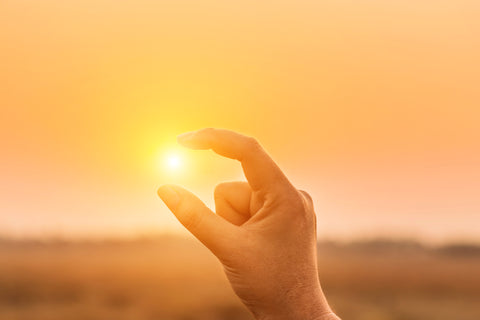Vitamin D, often referred to as the "sunshine vitamin," is essential for various bodily functions, including bone health, immune system function and mood regulation.
While the body can produce Vitamin D when exposed to sunlight, many people may not get enough sunlight due to factors such as living in regions with limited sunlight, spending most of the time indoors, or using sunscreen, which blocks the UV rays necessary for Vitamin D synthesis.

Vitamin D supplements are typically available in various forms, including capsules, tablets, soft gels and liquid.
There are two types of Vitamin D supplements available on the market. The first one, which is commonly recommended as it is suitable for Vegans and Vegetarians, is known as ergocalciferol (Vitamin D2). The second and much more popular form of Vitamin D is known as cholecalciferol (Vitamin D3).
The question whether cholecalciferol (Vitamin D3) is suitable for Vegetarians is not easy to answer. First of all, cholecalciferol (Vitamin D3) doesn’t have anything to do with either meat or dairy as it is sourced from sheep’s wool by purifying lanolin (wool grease).
More importantly lanolin goes through so many processes and purifications that the final product is actually a pure chemical (cholecalciferol).
Therefore, in my opinion it can be regarded as suitable for Vegetarians, all the more since production of cholecalciferol doesn’t require harming or killing animals.
However, since cholecalciferol (Vitamin D3) is still linked to an animal (as it is initially derived from the wool) some manufacturers, including HealthAid® decided to state that it is suitable for vegetarians but not vegans.
I am on a strictly plant-based (Vegan) diet and despite knowing this information, I have no problem taking 10,000 to 20,000 IU of this form of Vitamin D3 every day, as long as I get the confirmation it is derived from the wool of sheep and packed in a Vegan capsule.
I am not sure about other companies, but I have received confirmation that the cholecalciferol (Vitamin D3) used by HealthAid® is derived from lanolin (wool grease) from unharmed sheep.
Although some vegans would not want to take this form of Vitamin D as it still exploits and uses animals; it is an ongoing ethical debate.
On the other hand, Vitamin D2 (ergocalciferol) is not linked to any animal sources and therefore often recommended as suitable for Vegans, it is much inferior to cholecalciferol (D3) due to low bioavailability.
In addition to its poor absorption, it is also expensive and usually sold in capsules containing a very low strength of Vitamin D.
The low strength of supplements with Vitamin D2 is often the most important factor that should discourage Vegans and Vegetarians from choosing it over Vitamin D3, especially as most of us need at least 5,000iu and in some cases even 10,000 to 20,000IU a day.
Another argument often used against ergocalciferol (D2) is that unlike cholecalciferol (D3) it is made by radiating fungus and therefore regarded as not natural.
Some Vegans prefer taking this form because it is not derived from animals, but to tell the truth, it is foreign to the human body, poorly absorbed, sold in insufficient very low strength doses and therefore, not very effective.
In addition, used in higher doses, it is not only very expensive but has a much greater chance of Vitamin D toxicity. Which can cause nausea, vomiting, weakness and kidney problems.
Research comparing the usefulness of Vitamin D2 and Vitamin D3 has shown that D3 tends to be more effective in raising and maintaining serum 25-hydroxyvitamin D levels, which is the standard measurement used to assess Vitamin D levels in the body.
The difference in usefulness is due to the structural differences between D2 and D3, as well as differences in how they are broken down in the body.

Lichen-sourced Vitamin D3 is a type of Vitamin D that comes from fungus. To make this kind of Vitamin D3, we remove ergosterol from the lichen. Then, we expose the ergosterol to UV radiation. This is the form of Vitamin D that our bodies can use.
This process gives us a form of Vitamin D3 that's suitable for vegans because it doesn't involve any animal products.
With regards to Vitamin D supplements it is also very important to know they must be taken with well absorbed magnesium (such as citrate) as Vitamin D slowly leads to magnesium deficiency, as it requires magnesium in our body for conversion.
As people are usually already deficient in magnesium and almost never informed that Vitamin D requires magnesium supplements, they usually end up with sleeping problems and other unpleasant symptoms.
My favourite magnesium is MagCitra as it is high in elemental magnesium (the amount of magnesium which can actually absorbed by the body).
It is also better to take Vitamin D supplements in the morning as some people reported that after taking it in the evening, they experienced some sleep difficulties.
Vitamin D is essentially a hormone created during the daytime (in sunlight) and therefore taking it at night probably somehow encourages the body to stay awake.
If possible, they should be taken with breakfast as Vitamin D is a fat-soluble vitamin, meaning its absorption is more effective if consumed with dietary fat.
In addition to supplements, fortified foods can also be a source of Vitamin D for vegans and vegetarians.
Many plant-based milk alternatives, breakfast cereals and other fortified products are enriched with D2 or D3, sourced from vegan-friendly sources.
By incorporating these fortified foods into their diets, vegans and vegetarians can ensure they are meeting their Vitamin D requirements without relying solely on supplements.
Foods naturally rich in Vitamin D include fatty fish (such as salmon, mackerel, and tuna).
In conclusion, when it comes to choosing a Vitamin D supplement, there are various options available, including both vegan and non-vegan sources. Cholecalciferol sourced from lanolin or lichen provide effective options.
Related Articles
- Vitamin D - Deficiency & Health Benefits – HealthAid®
- The Most Effective Daily Dosage of Vitamin D – HealthAid®
- The Daily Requirement of Vitamin D – HealthAid®
Sources
- https://selfhacked.com/blog/vitamin-d-inflammation-autoimmunity/
- https://selfhacked.com/blog/vitamin-d-fertility-pregnancy/
- https://www.sciencedaily.com/releases
- https://www.ncbi.nlm.nih.gov/pubmed/
- https://coyne-healthcare.com/news/vitamins/
- https://www.thetimes.co.uk/article/
- https://www.youtube.com/
- https://articles.mercola.com/
- https://draxe.com/vitamin-d-deficiency-symptoms/
- https://www.mercola.com/article/vitamin-d-resources.htm
- https://www.ucsd.tv/search-details.aspx?showID=29085
- https://selfhacked.com/blog/vitamin-d-cancer/
- https://selfhacked.com/blog/vitamin-d-brain-health/
- https://selfhacked.com/blog/vitamin-d-hair-skin-health/
- https://selfhacked.com/blog/
- https://selfhacked.com/blog/vitamin-d-bone-health/
Any information or product suggested on this website is not intended to diagnose, treat, cure, or prevent any medical condition. Never disregard medical advice or delay in seeking it because of something you have read on this website. Consult your primary healthcare physician before using any supplements or making any changes to your regime.




